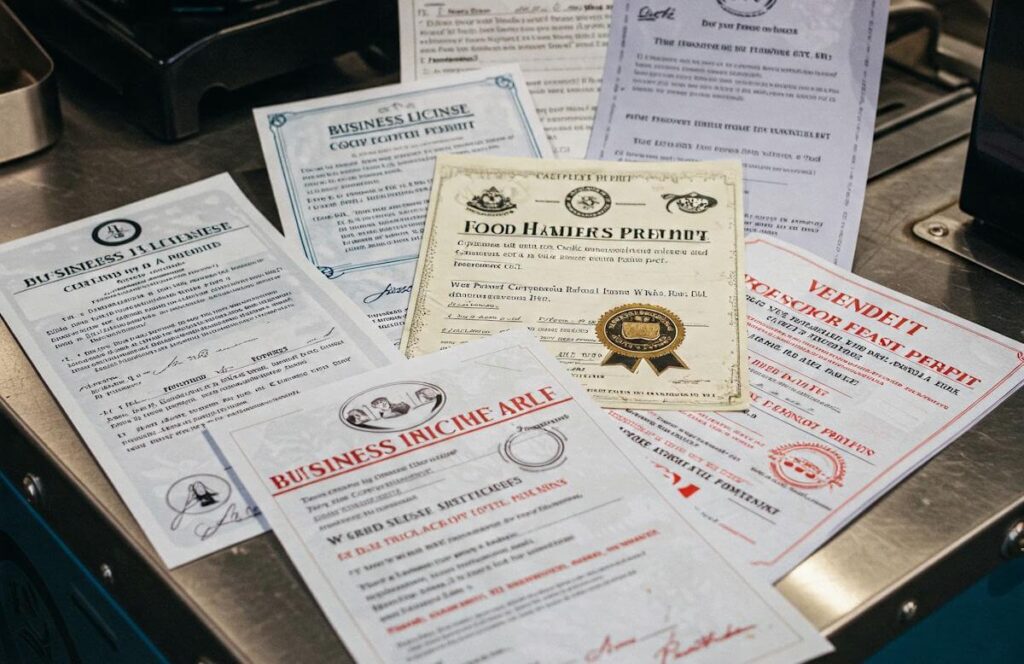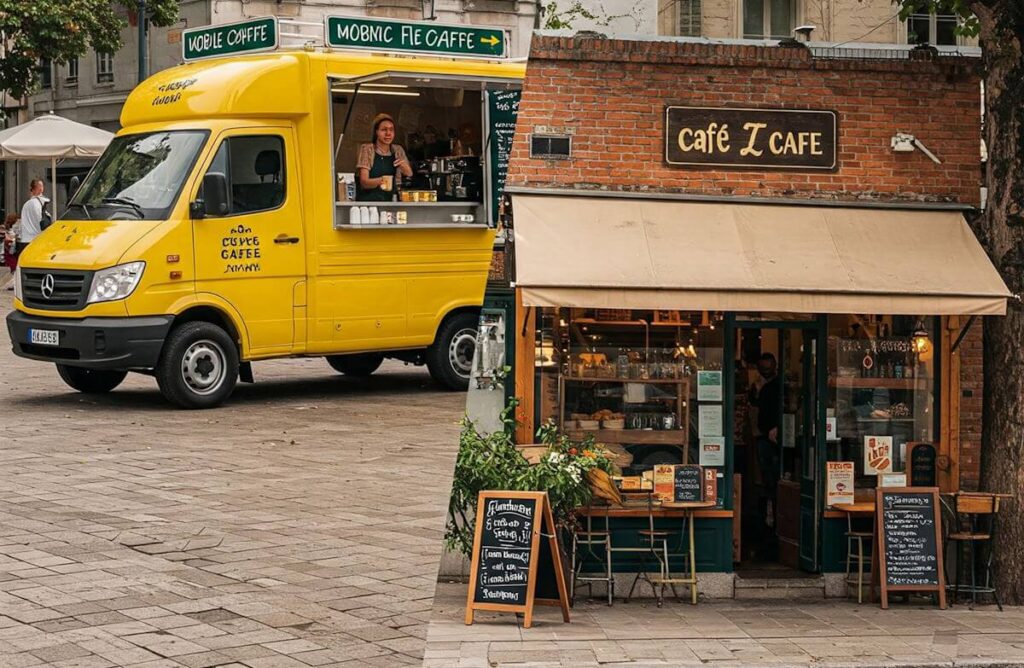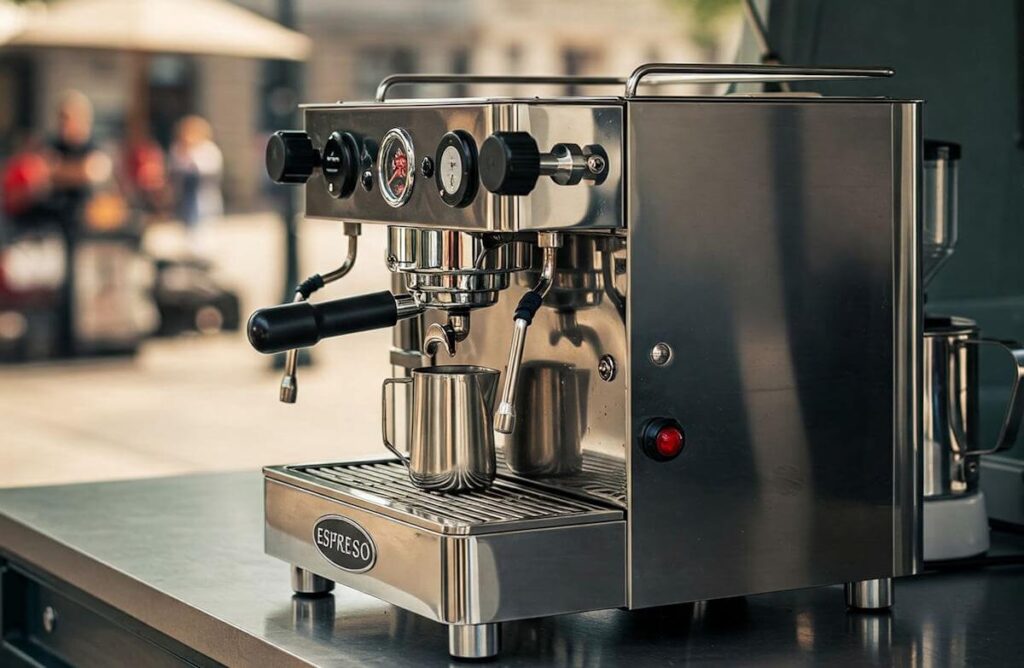Introduction to Mobile Coffee Businesses
The mobile coffee business has gained significant popularity in recent years, appealing to both entrepreneurs and coffee enthusiasts alike. This innovative business model allows vendors to serve high-quality coffee beverages directly to customers, often in high-traffic locations such as parks, festivals, and urban areas. Unlike traditional coffee shops, which typically require a fixed storefront, a mobile coffee business is characterized by its flexibility and adaptability to various environments.
Operating a mobile coffee shop presents numerous advantages for entrepreneurs. One of the primary benefits is the lower initial investment compared to setting up a brick-and-mortar establishment. Entrepreneurs can often start with a food truck, cart, or trailer, which requires fewer resources and mitigates the risks associated with long-term leases and property maintenance. Additionally, a mobile coffee venture permits operators to travel to various locations, catering to events and festivals while tapping into diverse customer bases.
The target audience for mobile coffee businesses is broad, encompassing casual coffee drinkers, remote workers, event-goers, and tourists. Due to the nature of mobility, these businesses can tailor their offerings to different demographics and occasions, providing specialty coffees, teas, and biscotti, which enhances customer engagement and satisfaction. Furthermore, as consumer preferences shift towards convenience and quality, mobile coffee shops are ideally positioned to capitalize on these trends by delivering artisanal products directly to customers. The potential for growth in this sector is significant, with many successful operators expanding into multiple units or franchising their brand.
In essence, the mobile coffee business represents a dynamic opportunity for entrepreneurs desiring to combine their passion for coffee with a flexible and responsive business model. This sector’s remarkable growth suggests that now is an ideal time to explore the possibilities of starting a mobile coffee venture.
The Importance of Licenses and Permits
Operating a mobile coffee business requires meticulous planning, especially regarding compliance with various regulations. Securing the appropriate licenses and permits is essential for several reasons. First and foremost, these legal documents allow a business to operate within the confines of the law, affirming the owner’s commitment to adhering to local, state, and federal regulations. Failing to obtain the necessary permits can lead to significant legal repercussions, including hefty fines or even the closure of the business, which can severely impact profitability.
Licenses and permits also play a vital role in safeguarding public health and safety. A mobile coffee business must adhere to health regulations, including proper food handling and sanitation practices. By acquiring the requisite health permits, the business can reassure customers of their commitment to maintaining high standards. Such compliance not only serves to protect the clientele but also helps in building trust between the vendor and the community. Customers are more likely to patronize a business that demonstrates responsibility in ensuring safe and clean service.
Furthermore, obtaining the necessary licenses can enhance a mobile coffee business’s reputation. A business that operates with all the necessary legal backing fosters an image of credibility and professionalism. This is crucial in a competitive market where customer sentiment can quickly shift based on perception. A well-regulated business demonstrates accountability, thereby increasing consumer confidence and potentially expanding the customer base.
In conclusion, the importance of licenses and permits in running a mobile coffee business cannot be overstated. They are not merely bureaucratic routines but critical elements that contribute to legal compliance, public safety, and business integrity. By prioritizing these aspects, entrepreneurs can establish a trusted and reliable coffee service, promoting long-term success in the industry.
Types of Licenses Required for Mobile Coffee Businesses
When establishing a mobile coffee business, obtaining the necessary licenses and permits is essential for ensuring compliance with local laws and regulations. Each license serves a distinct purpose, contributing to the legal framework under which your business will operate. The primary types of licenses required include food service licenses, health permits, and business licenses.
The food service license is one of the most critical permits for any mobile coffee business, as it grants the legal authority to serve food and beverages to the public. This license typically requires adherence to local health regulations, ensuring that your products meet safety and quality standards. Without this license, your operation might be subject to fines or, in severe cases, closure.
Health permits, often a requirement of local health departments, are also vital for mobile coffee businesses. These permits ensure that the mobile unit is compliant with hygiene and sanitation standards. Health inspectors may evaluate your equipment, food storage practices, and overall cleanliness to approve your operation. Regular inspections are often necessary to maintain this permit, thus ensuring ongoing compliance with health codes.
In addition to food service and health permits, a general business license is usually required. This license identifies your business to the local government and may vary depending on the business structure (e.g., sole proprietorship, partnership). Applying for a business license also often involves paying a fee and might require proof of zoning compliance to confirm that your mobile coffee unit can operate in the selected area.
Understanding and properly acquiring these licenses is crucial for the success of a mobile coffee business. Ensuring compliance will not only facilitate smoother operations but also enhance the credibility of your brand among customers. By securing the appropriate licenses, you’re laying the groundwork for a sustainable and reputable business model.
Health and Safety Regulations
When starting a mobile coffee business, understanding and complying with health and safety regulations is paramount. These regulations are designed to ensure the safety of both the customer and the business owner. First and foremost, sanitation standards play a critical role in the operation of mobile coffee units. It is essential to maintain a clean and hygienic environment from which to serve beverages. Regular cleaning of equipment, surfaces, and even the mobile unit itself is a requirement that cannot be overlooked.
In addition to sanitation, mobile coffee businesses must adhere to strict food handling requirements. This includes the proper storage, preparation, and serving of coffee and any related food items. Employees should always practice safe food handling to prevent contamination and foodborne illnesses. Training staff in food safety is not just advisable but often a requirement dictated by local health regulations, which helps to ensure compliance with the prescribed standards.
It is vital to familiarize oneself with local health department regulations, as these can vary from one region to another. Commonly, a mobile coffee business will need to obtain permits that may include food service licenses, health permits, and possibly specialized permits for operating in certain public spaces. Regular inspections from health officials can also be part of the compliance process, which necessitates a proactive approach to maintain adherences.
To avoid penalties and ensure compliance, regular audits of health practices and a robust training program for employees on sanitation and safety can be invaluable. Keeping abreast of local regulations, scheduling routine maintenance, and conducting thorough self-checks can significantly enhance the operational integrity of a mobile coffee business. Doing so not only meets legal obligations but also elevates customer trust and satisfaction.
Zoning and Location Permits
For aspiring mobile coffee vendors, understanding zoning laws and acquiring the appropriate location permits is critical to the success of their business. Zoning regulations, enforced by local governments, dictate where individuals can operate their businesses, including restrictions on street vending and the use of public spaces. These regulations are intended to maintain public order, ensure safety, and support the community’s economic development.
As a mobile coffee vendor, you must determine the specific zoning laws applicable to your area. These laws can vary significantly from one municipality to another, and thus, it is essential to consult local government resources or a zoning expert. In many jurisdictions, mobile vendors may be restricted to certain areas, which might include city parks, sidewalks, or designated vending zones. Knowing these regulations can help avoid legal issues and potential fines that could arise from operating in an unauthorized location.
Additionally, obtaining the necessary location permits is paramount. Typically, this process will involve applying for a street vending permit or a special use permit, depending on the local ordinances. Each permitting process may have unique requirements, such as health inspections, liability insurance, or compliance with food safety regulations. It is crucial to complete these steps diligently to ensure that your mobile coffee business can operate without interruption.
Moreover, collaborating with local business associations and networks can provide valuable insights into optimal locations for operating your mobile coffee service. Engaging with the community and understanding public demand can give your business a competitive edge. In summary, diligent research and adherence to zoning laws and location permit requirements are essential first steps for establishing a mobile coffee business successfully.
Sales Tax Permits
For any mobile coffee business, obtaining a sales tax permit is a crucial step in ensuring legal compliance and successful operations. A sales tax permit, often referred to as a sales tax license, grants a business the authority to collect sales tax from customers on taxable sales. In essence, it acts as a registration with the state tax authority, signaling that the business is legitimate and authorized to engage in commercial activities.
The process of acquiring a sales tax permit typically begins on the state level. Business owners must apply through their respective state tax agency, which may require providing basic business information, such as the legal name of the business, address, and details about ownership. The application may also require a few additional documentation steps, including an Employer Identification Number (EIN) from the Internal Revenue Service, identification verification, and potential zoning permits affirming the mobile business is allowed to operate within the intended area.
Once granted, the mobile coffee business must diligently adhere to the sales tax collection and reporting obligations. This involves collecting sales tax from customers on each applicable sale and accurately reporting and remitting these funds to the state on a regular basis, which may be monthly, quarterly, or annually, depending on the state’s requirements. It is essential to keep detailed records of all sales transactions and the taxes collected, as this documentation will be critical when filing sales tax returns and during audits or reviews from tax authorities.
Moreover, it is vital for mobile coffee entrepreneurs to familiarize themselves with different local tax rates and any variations that may exist by jurisdiction. By ensuring compliance with sales tax regulations, business owners help maintain public trust while simultaneously positioning their mobile coffee venture for long-term success.
Food Truck Licensing and Requirements
Launching a mobile coffee business from a food truck involves various licensing and permit requirements that ensure compliance with local and state regulations. One of the primary licenses needed is a food service license, which permits the operation of a mobile food establishment. This license is often issued by local health departments, and obtaining it requires an application process, which may include providing documentation about the food truck itself as well as the type of food and beverages offered.
In addition to a food service license, mobile coffee businesses must typically pass safety inspections. These inspections assess various aspects of the food truck, including sanitation practices, equipment maintenance, and food storage methods. Health inspectors evaluate whether the food truck meets local health codes, which aim to guarantee customer safety. Failure to meet these standards can result in fines or the denial of your permit, making it essential to adhere strictly to all safety regulations.
Furthermore, vehicle licensing is another crucial element. Most states require the food truck to be properly registered and insured, which protects both the business and its customers. This registration process can vary, so it is advisable to consult with local regulatory agencies to ensure compliance with specific vehicle requirements. Additionally, if the food truck operates in particular areas or at special events, permits may be required for those specific locations. Business owners should check for zoning laws and vendor permits that dictate where food trucks can operate.
Last, it’s important to stay informed about any changes in legislation that could impact your mobile coffee operation. Doing so will help maintain compliance and promote a successful business. Overall, understanding the specific licenses and permits necessary for your mobile coffee business will not only keep you within regulatory requirements but also enhance your customers’ trust and satisfaction.
Insurance Needs for Mobile Coffee Businesses
When operating a mobile coffee business, ensuring appropriate insurance coverage is pivotal to protect both the business and its employees. One of the primary forms of insurance required is general liability insurance. This policy is essential for safeguarding against potential claims arising from injuries or damages that could occur during business operations. For instance, if a customer were to slip and fall near the mobile coffee unit, general liability insurance would cover the legal costs and any settlements that may arise.
Additionally, property insurance is crucial for mobile coffee businesses. This type of insurance protects the physical equipment associated with the venture, including coffee machines, grinders, and mobile units themselves. A property insurance policy typically covers losses due to theft, vandalism, or even unexpected events such as fires. For mobile coffee shop entrepreneurs, maintaining equipment in pristine condition is vital, and property insurance provides a safety net for potential financial losses.
Furthermore, depending on the specific needs of the mobile coffee business, other types of insurance might also be beneficial. For example, if the business employs staff, workers’ compensation insurance is a requisite. This policy ensures coverage in the event that an employee sustains injuries while on the job, offering them medical benefits and wage replacement during recovery.
In addition to these foundational covers, mobile coffee businesses may consider specific policies tailored to their unique needs, such as commercial auto insurance if the business operates vehicles as part of its service. It is advisable for entrepreneurs in the mobile coffee industry to consult with insurance professionals to identify comprehensive coverage options suited to their operational dynamics.
Steps to Obtain Required Licenses and Permits
Starting a mobile coffee business involves navigating a complex landscape of licenses and permits. To ensure a successful launch, it is essential to understand the process involved in securing the necessary authorizations. Below are the steps typically required to obtain the licenses and permits relevant to a mobile coffee business.
First, research the specific requirements for your location. Each state and municipality may have unique regulations governing mobile food vendors, including coffee businesses. Consulting the website of your local health department or small business administration can provide valuable insights into what is required.
Next, gather the necessary documentation. Commonly required documents include proof of liability insurance, a business license application, valid identification, and potentially a food handler’s permit. Check if you need to obtain a special permit for operating in certain locations or during events. Collecting these documents ahead of time will help streamline the application process.
After collecting the required documents, submit your application to the appropriate governing body. This may involve submitting paperwork to multiple agencies including local health departments, city municipal offices, and zoning boards. Be prepared to pay any associated fees, which can vary widely based on location and the specific permits sought.
Once your application has been submitted, ensure you follow up regularly. Timelines for approval can vary; some permits may take only a few weeks, while others might take a couple of months. It is prudent to stay informed about the progress of your application and be proactive in addressing any additional requests from the authorities.
Finally, consider seeking assistance from professionals, such as business consultants or legal advisors, who specialize in licensing for food businesses. Their expertise can be invaluable in navigating the complexities of obtaining the necessary licenses and permits for your mobile coffee venture.




